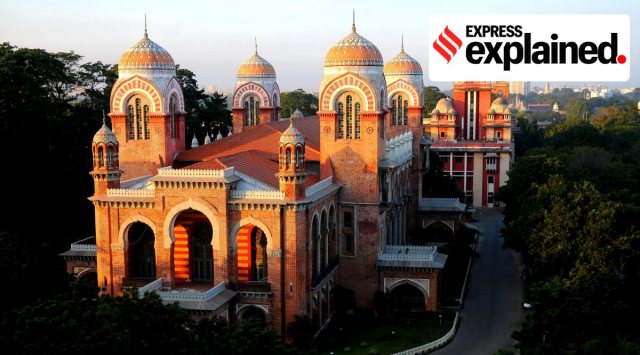States vs Centre on selection of Vice-Chancellors: rules, friction
Tamil Nadu has passed two Bills proposing to take away the Governor’s powers to appoint VCs of state universities. Which other states have done this, and why?
 The Senate House, Madras University. (Source: Wikimedia Commons)
The Senate House, Madras University. (Source: Wikimedia Commons)The Tamil Nadu Assembly passed two Bills on Monday that seek to transfer the Governor’s power in appointing Vice-Chancellors of 13 state universities to the state government, currently led by the DMK. Chief Minister MK Stalin said the Bills were required as the Governor was disregarding the state government’s opinion on the appointments of VCs, an argument also made by states such as Maharashtra and West Bengal in the past.
A look at the rules guiding the appointments of VCs across states reveal wide variations, leaving the field open for dispute, particularly in cases where there are sharp political differences between the state and the Centre, which appoints the Governors.
What are the highlights of the two Bills?
The Bills passed in Tamil Nadu stress that “every appointment of the Vice-Chancellor shall be made by the Government from out of a panel of three names” recommended by a search-cum-selection committee. Currently, the Governor, in his capacity as the Chancellor of state universities, has the power to pick a VC from the shortlisted names. The Bills also seek to empower the state government to have the final word on the removal of VCs, if needed. Removal will be carried out based on inquiries by a retired High Court judge or a bureaucrat who has served at least as a Chief Secretary, according to one of the Bills.
Are other states trying to curtail the Governor’s role in appointing VCs?
Yes. In December, the Maharashtra Assembly passed a Bill amending the Maharashtra Public Universities Act, 2016. Under the original Act, the Maharashtra government had no say in appointment of VCs. If the changes take effect, the Governor will be given two names to choose from by the state government, currently ruled by the Shiv Sena-NCP-Congress, following a panel’s suggestions.
In 2019, the West Bengal government, led by the Trinamool Congress, took away the Governor’s authority in appointing VCs to state universities. It has also hinted at removing the Governor as the Chancellor of the universities.
In Left-ruled Kerala, the Governor alleged that the appointment of the Vice-Chancellor of Kannur University was done against his wishes. The BJD government in Odisha has also tried to bring appointments to state universities under its control. But it has been challenged by the University Grants Commission (UGC).
What is at the root of the differences?
In West Bengal, Maharashtra and Tamil Nadu, the elected governments have repeatedly accused the Governors of acting at the behest of the Centre on various subjects, including education. The regulations, which differ from state to state, are often open to interpretation and disputes are routine.
In fact, the Tamil Nadu Bills make a case for giving the state government the upper hand in the VC appointment process by citing the examples of Gujarat and Telangana. “It is considered that in line with the aforesaid (Gujarat, Telangana) State University Laws, the Government of Tamil Nadu should be empowered to appoint the Vice-Chancellors of the State Universities,” both Bills state.
In Karnataka, Jharkhand and Rajasthan, state laws underline the need for concurrence between the state and the Governor. The terms “concurrence” or “consultation” are absent from state legislation in most cases.
What is the UGC’s role in this?
Education comes under the Concurrent List, but entry 66 of the Union List — “coordination and determination of standards in institutions for higher education or research and scientific and technical institutions” — gives the Centre substantial authority over higher education. The UGC plays that standard-setting role, even in the case of appointments in universities and colleges. According to the UGC (Minimum Qualifications for Appointment of Teachers and other Academic Staff in Universities and Colleges and other Measures for the Maintenance of Standards in Higher Education) Regulations, 2018, the “Visitor/Chancellor” — mostly the Governor in states — shall appoint the VC out of the panel of names recommended by search-cum-selection committees. Higher educational institutions, particularly those that get UGC funds, are mandated to follow its regulations. These are usually followed without friction in the case of central universities, but are sometimes resisted by the states in the case of state universities.
What are the rules in Gujarat and Telangana?
The Gujarat University Act, 1949 states that “the Vice-Chancellor shall be appointed by the State Government from amongst three persons recommended by a (search-cum-selection) committee”. The Telangana Universities Act, 1991 states that the search committee shall “submit a panel of three persons to the Government in alphabetical order and the Government shall appoint the Vice-Chancellor from out of the said panel”.
Last month, setting aside the appointment of the Vice-Chancellor of Gujarat’s SP University by the state government, the Supreme Court made some key observations.
What were these observations?
A Bench of Justices M R Shah and B V Nagarathna said “any appointment as a Vice Chancellor contrary to the provisions of the UGC Regulations can be said to be in violation of the statutory provisions, warranting a writ of quo warranto”. It said every subordinate legislation of the UGC, in this case the one on minimum standards on appointments, flows from the parent UGC Act, 1956. “Therefore, being a subordinate legislation, UGC Regulations become part of the Act. In case of any conflict between state legislation and central legislation, central legislation shall prevail by applying the rule/principle of repugnancy as enunciated in Article 254 of the Constitution as the subject ‘education’ is in the Concurrent List of the Seventh Schedule of the Constitution,” it ruled.
Newsletter | Click to get the day’s best explainers in your inbox







































